|
|
|
Sort Order |
|
|
|
Items / Page
|
|
|
|
|
|
|
| Srl | Item |
| 1 |
ID:
158725
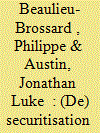

|
|
|
|
|
| Summary/Abstract |
This article theorises the simultaneous enaction of securitising and desecuritising moves. It argues that the frequent simultaneity of these two processes, which are normally considered mutually exclusive within Securitisation Theory (ST), has previously gone unnoticed given a set of methodological, temporal, and ontological biases that have developed within ST. Demonstrating how these biases can be overcome – and even reconciled with the seminal texts of ST – by drawing on work from within social theory and elsewhere, we argue that the frequent simultaneity of (de)securitising moves most urgently requires us to reconsider the normative status of desecuritisation within ST. Although desecuritisation has traditionally been viewed as normatively positive, we argue that its temporally immanent enaction alongside securitising moves might introduce more violence into security politics and, in fact, exacerbate protracted conflicts. Ultimately, we make the normative ambitions of some within ST more opaque. Desecuritisation is not a shortcut to the ethical-political good within ST.
|
|
|
|
|
|
|
|
|
|
|
|
|
|
|
|
| 2 |
ID:
175367
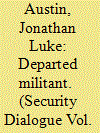

|
|
|
|
|
| Summary/Abstract |
This is an essay about the personhood of militant violence, the phenomenological underpinnings of political evil and the friendship between two men. It begins by recounting the author’s street-side meeting with several Islamist militants in Tripoli, Lebanon, one of whom later described his preparations to become a ‘martyr’ in Syria. The essay takes my conversations with this man and his friends as a means of exploring the becoming of violent militancy as a fundamentally creative and essentially joyful series of encounters that lead to the emergence of extreme violence. To do so, I read the narrative account at the centre of the essay through the concept of social and political ‘fracturing’, which is described as the process through which individuals or groups are able to transcend traditional limits on knowledge, action and belief. This discussion of social and political fracturing is then brought into conversation with the question of what constitutes social or political evil in order to demonstrate that debates over what produces violent militant mobilization have generally missed the crucial relevance of a set of small, intimate and embodied rituals that suffuse evil, violence and war-fighting more generally with a fundamentally positive (yet eventually destructive) phenomenology.
|
|
|
|
|
|
|
|
|
|
|
|
|
|
|
|
| 3 |
ID:
164283


|
|
|
|
|
| Summary/Abstract |
What does it mean to study security from a critical perspective? This question continues to haunt critical security studies. Conversations about normative stances, political engagement, and the role of critique are mainstays of the discipline. This article argues that these conversations tend to revolve around a too disembodied image of research, where the everyday practice of researchers is sidelined. But researchers do do research: they work materially, socially, and cognitively. They mediate between various feedback loops or fields of critique. In doing so, they actively build and exercise critique. Recognizing that fact, this article resists growing suggestions to abandon critique by, first, returning to the practice of critique through the notion of companionship. This permits us to reinvigorate our attention to the objects, persons, and phenomena through which critique gains inspiration and purpose, and that literally accompany our relationship to critique. Second, we explore what happens when our companions disagree, when critique faces controversies and (a) symmetries. Here, we support research designs of tracing credibility and establishing symmetries in order to move away from critique as denouncing positions we disagree with. Third, we discuss the relation between companionship, critique, reflexivity, and style. Here, the rhetorical practices of critical inquiry are laid out, and possibilities for its articulation in different and less silencing voices are proposed.
|
|
|
|
|
|
|
|
|
|
|
|
|
|
|
|
| 4 |
ID:
166762
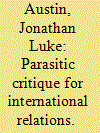

|
|
|
|
|
| Summary/Abstract |
This paper introduces the concept of a “parasitic critique.” It begins by theorizing the ethico-political positionality of “critical” researchers by speaking with Michel Serres to introduce the figure of the parasitic-researcher. That device explores a tension in critical research between hearing “thick” descriptions of our interlocutors’ lifeworlds before channeling them into “thin” metatheoretical accounts. The paper argues that this dilemma relates to the rhetorical “style” of critical approaches in IR, which employ a certain “suspicious hermeneutics” that is unwilling to take seriously the voices of particular interlocutors. By contrast, a parasitic critique is laid out as a critical orientating sensibility focused on reordering the methods of critique, with the hope of cultivating a non-judgmental ethic of “care-full” analysis and description. This argument is made by drawing out one “lay” critical theory of political violence that sees critique make a three-fold switch from suspicion to learning, exclusion to combination, and contradiction to composition. Throughout, these claims are nested within self-reflections on work interviewing both victims and perpetrators of torture, which demonstrate—often uncomfortably—how it is necessary to find points of critical sympathy between the subjugator and the subjugated that can be leveraged for the ethico-political good.
|
|
|
|
|
|
|
|
|
|
|
|
|
|
|
|
| 5 |
ID:
193300
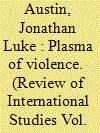

|
|
|
|
|
| Summary/Abstract |
How do people know how – very practically speaking – to be violent? This article explores that question through a Science and Technology Studies perspective. It does so in order to go beyond the usual location of global political violence at a structural level that attributes its emergence principally to hierarchical orders, formal training, or deep cultural, political, or ideological factors. The alternative explanation offered here draws on Bruno Latour's concept of ‘plasma’ to sketch a theory of how practices of violence are embedded at a distributed ontological level through the historical accumulation of (popular) cultural, textual, technological, and other epistemic objects. In making that claim, I seek to stress how violent knowledge circulates outside the formal domains associated with it (the military, police) and is instead preconsciously accessible to each and every person. To support this argument, the article draws on empirical examples of the use of torture, including interviews conducted with Syrian perpetrators of torture, as well as by tracing the paradoxical entanglements between scientific practice and the practice of torture. I conclude by engaging the field of preventive medicine to speculate on the need to develop modes of violence prevention that appreciate political violence as a population-level sociopolitical problem.
|
|
|
|
|
|
|
|
|
|
|
|
|
|
|
|
| 6 |
ID:
169160
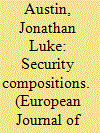

|
|
|
|
|
| Summary/Abstract |
This article argues that security politics is constituted through the ways in which its contours are ‘made sensible’ (perceivable to our senses) through material, aesthetic, or affective mechanisms. To make this argument, the article introduces the theoretical scaffolding for what it terms a compositional ontology. A compositional approach to security identifies, theorises, and studies the perceptual base of security politics in order to ask how – say – the sight of a single photograph, sound of a security announcement, or smell of tear gas, can frequently be the direct (efficient) cause of international security policy, discourse, and decision. To theorise the deep political impact of such fleeting moments of local sensory experience, the article lays out a compositional ontology comprised of a synthesis of poststructuralist and new-realist philosophy, as well as the empirical sensibilities of pragmatist sociology. Combined with a focus on sensibility, it is shown that these approaches can produce an ontology of security that more effectively explains contingency, fluidity, and change in world politics. Having laid out the theoretical frame for a compositional ontology, the article discusses its political and methodological implications, suggesting it demands that security studies shift towards a more postcritical, experimental, and collaborative ethos.
|
|
|
|
|
|
|
|
|
|
|
|
|
|
|
|
| 7 |
ID:
188992
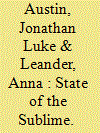

|
|
|
|
|
| Summary/Abstract |
Security politics is everywhere, its tendrils entangled with every aspect of life. Nonetheless, this hyper-securitised status quo has not interrupted the flow of everyday life, nor the circulation of people, goods, or ideas. For the privileged of the world, a paradox has emerged: war, terrorism, ecological disaster, pandemics, and many other ‘monstrous’ forms of insecurity are now experienced as mundane and manageable phenomena in spite of the exceptional political measures, and more generalised affective states of fear and anxiety, that they have proliferated. How has this occurred? This article argues that aesthetic processes and politics are fundamental to the maintenance of this paradox. To do so, we draw on Bruno Latour’s concept of ‘transfrayeurs’ (trans-fears) to understand how modes of aesthetic design are deployed to simultaneously locate sublime imaginaries of insecurity in our midst while also allowing us to live with, accept, and forget their presence. More specifically, we suggest that trans-fearing is achieved through ‘aesthetic protocols’ that specify principles for designing material, affective, and discursive forms into our lives in ways that allow for the careful ‘calibration’ of how we (unequally) experience a hierarchised, depoliticised, and militarised ‘state of the sublime’ within global security politics.
|
|
|
|
|
|
|
|
|
|
|
|
|
|
|
|
| 8 |
ID:
145111
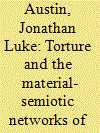

|
|
|
|
|
| Summary/Abstract |
The intimately local violence of torture is, simultaneously and increasingly, a global phenomenon. This paper explores a transnational convergence in the local morphologies of torture practices across time, space, and state-type through an inquiry into its global ontologies. Drawing on the insights of Actor-Network Theory, the papers introduces a material-semiotic mode of inquiry into violence in order to locate the (re)emergence and (re)convergence of torture practices within a hitherto unnoticed space of violence constituted by the circulation of violence-enabling knowledges, visual and textual inscriptions, human persons, and non-human material objects. This analysis is based on evidence gathered from interviews conducted with Syrian victims and perpetrators of torture, alongside primary and secondary sources detailing torture in other localities, which stresses the importance of tracing local instances of torture through to these material-semiotic networks of violence across borders. Concluding with a theory of the spatio-temporal oscillation of violent practices, which highlights the analytical limits of both the constructivist literature on norms and the decisionism of literatures on political exceptionalism, the paper argues that its mode of inquiry provides novel and important insights for comprehending the stubbornness of the “global crisis” in torture that Amnesty International has described for over forty years.
|
|
|
|
|
|
|
|
|
|
|
|
|
|
|
|
|
|
|
|
|